- Home
- Al Sarrantonio
Sebastian of Mars Page 15
Sebastian of Mars Read online
Page 15
I reached briefly beneath my white blouse to feel the long dagger secreted there.
As instructed, as we approached, we raised the silver plates higher, so that the Queen would see not our faces but only her food. I noted the severity of her face, the cruel lines just as they had been described to me, the sallow cast to her features, the thin whiskers and almond eyes. It was the cruelest visage I had ever seen or imagined.
We stepped up the single step, and stood before her, eyes downcast, offering the food.
The taster capered like a clown next to us, waiting, making hungry noises in his throat.
“You may set it down,” Frane said, in a surprisingly melodious voice.
I caught her eye for the merest second as I placed the perfect vegetables before her and stood up straight.
My paw inched beneath my tunic, and began to draw it out.
But her eyes blazed not at me but at Keisha, whose own dagger, thinner and longer than my own, was revealed now.
“Death to you! You murdered my husband and my planet!” Keisha screamed – but it was a scream of triumph turned to pain as her body arched forward, the dagger plucked on its downward arc and another, firmer, more sure blade planted in her back by the taster, whose eyes were now hard as ice.
The blade came through her front, staining her white apron with a spreading pool of blood.
She gave a little sigh and collapsed, and in the chaos that erupted – Frane immediately surrounded and pulled from her chair to safety, the ten guards who drew their own blades and sank them into Keisha’s now lifeless body – I slipped my own dagger out of its hiding place and let it drop to the floor.
I kicked it aside, unseen, and turned to go.
I felt a heavy hand on my shoulder.
I turned and looked into the face of the Captain, who hissed, “Get out of here, now, if you value your life.” He began to hustle me away from the table, toward the exit. He held me like his prisoner, and walked me through the mass of guards who blocked the way, shouting, “Do you know who I am?”
They moved aside, letting us pass.
When we were beyond the tent, in the cool night air, he shook me as if I were a baby and roared, “Why did she have to do this! She was the best chef I ever had!” He turned to me. “And now you are! Or would you rather die?”
His face was suffused with madness.
“I will be your chef.”
“Good! Then go, and finish the meal. I will talk to her. This kind of thing has happened before, and I will convince her that you had nothing to do with it. She knows how much my fetes mean to morale – otherwise I would be dead by now.” He rattled me again. “Just do as you’re told – and continue to cook!”
“Yes, sir,” I said, and when he let me go, and stalked back toward the tent, I watched him bull his way through and then went back to finish the next course.
I waited for an execution that didn’t come. The next morning what little word there was concerning the attempt on the Queen’s life was relegated mostly to rumor. I said nothing, understanding that it would mean my life. By the end of the day it was as if nothing had ever happened.
But the large tent was soon taken down, and then the two side tents, leaving the captain with his original place to entertain. The meals became sparsely attended, and then, within a week, no one attended at all. The captain took his meals alone, his face taking on a haggard look.
One night, after I had served a desert pastry, a thing of cream and the thinnest layers of pastry dough, which Darwin had become adept at, the captain took me almost gently by the arm as I was leaving.
“I’ve been given a choice,” he said, his voice as vapid as his eyes.
“Yes, sir?”
He nodded. “A choice, do you understand? I want to thank you for all the wonderful meals you’ve made. They’ve made these past days . . . bearable.”
I bowed. “Thank you, sir.”
He turned to an opened bottle of wine which I had not brought, and sat unpoured on the table beside an empty glass.
“Would you like me to replace that with a desert wine, sir?” I asked.
Distracted, he looked at me. “No. This . . . will be fine.” His face brightened for a moment. “Is there by any chance another of those pastries?”
I bowed again. “I think Darwin made an extra, Captain.”
“Excellent! May I have it?”
“Of course.”
I retrieved the extra pastry, and when I returned to serve it he was just pouring a glass of wine from the open bottle, with a trembling paw. The wine was the deepest red I had ever seen.
I placed the pastry before him, but he only stared at the wine glass before him.
“I would leave this camp if I were you,” he said in a funereal voice. He turned to look at me. “Tonight. I told you I had been given a choice. They will not give you one.”
“Yes, sir.”
I glanced back at the flap of the tent, and he was still staring at the wine glass, the pastry ignored.
The next morning he was dead.
But Darwin and I had already deserted, just before the guards came for me.
Twenty Four
It was remarkably easy for us to hide. In an army so huge, on the march, it was impossible to keep track of two unobtrusive cooks. And unobtrusive was what we made ourselves, all the while edging closer to the front.
To my surprise, and our luck, once we got away from the rear our task became even easier. The veteran portions of this vast enterprise had been moving for months, and a kind of lassitude had set in. It was as if the center of the beast was soft. Discipline was still strict, and disobedience met with the iron hand, but, day to day, boredom was the rule. These soldiers had seen no real action in quite a while, their main purpose being to escort a catastrophic weapon and little more. To them, it was little more than guard duty, and even their officers had become jaded.
We learned, by sitting in on many late night card or dice games, that no forces of the second republic had been engaged for weeks. It was as if they had vanished from the earth. It was rumored that Xarr was dead or forced into exile, that I myself was dead.
“The pup had run with his tail between his legs!” was a comment I often heard at these drunken affairs. I must admit it made me smile inwardly, that the wine-soused corporal, unkempt and belching, and who had just taken money from me by rolling two fives on the bones, was telling this to the very feline who he spoke of. There was a somewhat grim inner satisfaction it gave me.
“And where are those louts who guard the weapon?” I asked this same corporal, late into the same night, when he could barely stand but had continued to cheat me, for the dice, it became obvious, were loaded.
He stopped counting his money and stared at me blearily for a moment, a nearby fire shadowing his drunken features.
“Eh?”
I repeated my question, and added, “One of the louts owes me money!” I showed him the surfeit of coins in my hands. “And if I get it from him, I can play dice with you again tomorrow night!”
“Ah!” His face brightened for a moment, but then he looked down at all the money in his paw.
“Got plenty of money! Play!” He swayed from side to side before regaining his balance.
I repeated my question once more, and he said, “Ah!” again and then, “That no-good Finch and his bunch! Nothin’ bu’ babysitters!”
“Yes,” I said, seeking to keep him awake. “He’s the one! Where are they?”
He pointed vaguely over his shoulder. “Tha’ way. Tell ‘im Cheyenne sent you. Owes” – here he paused for a belch – “me money too.”
And then he fell over, still clutching his winnings in his palm, and was dead asleep on the ground and snoring.
So Darwin and I moved in the direction Cheyenne indicated, carefully, slowly, gambling and sometimes cooking when a cook was needed, as, in the distance, Olympus Mons grew daily at the horizon, its monstrous bulk eating up more of the western sky.
&
nbsp; And always, we slipped closer, closer, to our prey.
Which I found unexpectedly, on the rare morning when Darwin and I split up, each to meet at a certain spot at noon. It was like moving through a slow carpet of red, and I had learned always to look as if I had somewhere to go or someone to meet. On the rare occasion when I was confronted, my original papers always seemed to do the trick, because cooks were scarce everywhere. My only fear was that I might be connected to the late unlamented captain, but this never came up. This far away from where it had happened, the attempt on Frane’s life had become, though the passage of misinformation, a heroic act on her part, as, according to these ever-changing false accounts, she had stood upon the table when confronted by her would-be killer, and slain the woman on the spot, or, in other versions, after a lengthy duel, for the assassin had been a trained swordsman, and deft in the many arts of killing, but Frane had outwitted her at every turn. In one version the fight had gone on for the entire night, Frane deliberately waiting for dawn to defeat her foe so that the Sun, her equal, could witness it. It was amazing what damage to the truth the feline tongue could do, merely by repeating a simple story. It had, in the intervening days, become a heroic epic, with Frane, naturally, as the hero.
When noon came, Darwin did not meet with me at the spot we had agreed on. This bothered me, but I did not worry about him. He had proved much more adept at subterfuge and cunning than I, and his actions had been an education to me.
I made careful inquiries, slowly widening my circle through the ranks, but no one had seen the little fellow or even heard of him.
And then fate intervened, and I found what I had been looking for since One had sent me on this quest.
Late in the afternoon, I passed a group of half-asleep guards and heard the name, “Finch” uttered, with near contempt. The day’s march had ended, and there were rumors (there were always rumors) that there would be no movement until the following morning. I had resigned myself to the fact that Darwin was nowhere nearby, and that I would have to spend a night of gambling, and discreet inquiry, alone, which was an unpleasant thought because Darwin was also a better gambler than I.
I sauntered past the guards, and then turned back, as if a thought had suddenly come into my mind.
“Say, fellows,” I said, as offhandedly as I could, “you wouldn’t happen to know where Finch is, would you?” I allowed a small measure of contempt to enter my tone when I mentioned his name.
The tallest of the three of them narrowed his eyes at me. “Why?”
“He owes me money, actually.”
The tall one twitched his whiskers and waved a paw in dismissal. “He owes everybody money!”
“Yes, but . . .” and I leaned closer, conspiratorially, and whispered, “this money was supposed to buy you fellows a good meal. I’m a cook, and when he lost to me at the bones he promised enough and bargained a good meal for his guards for even more. If I get him to pay me you boys get . . .”
And I proceeded to rattle off a menu that made their mouths nearly water, which would actually use up the scant stocks of Tyron’s spices I had left.
The tall one stopped me and said, pointing, “Head that way, a half mile. You’ll meet up with the guard on duty. His name is Morphus. Tell him that Jilly sent you.” He grabbed my arm, almost pleading. “When do we get this grub? I’ve been chewing hard tack for a week, and my teeth and belly can’t take it anymore!”
“Soon, I promise,” I said, taking my leave of them.
It was almost dark when I found Morphus, and told him Jilly had sent me. He was little impressed. He and his two companions guarded the single opening in a ring of wagons, which had been drawn into a wide circle. Each wagon had at least one guard, sometimes two. I imagined this makeshift fortress was assembling after the finish of every march.
I repeated my good meal scenario and Morphus’ interest was ignited. Only this time I said that I had lost a bet, and had been made to pledge my cooking skills to Finch and his guards for one evening. I showed them my money, which I said were to bribe the finest foods in camp.
“I hear you fellows are sick of hardtack, “ I said, and once again went down my imaginary menu.
“When is this feast?” Morphus asked eagerly. The other two guards had moved closer to better hear my promises.
“As soon as I can arrange it. When do you fellows get off duty?”
Boredom replaced eagerness. “Not for six hours yet. Then Jilly and his second-raters come on.”
I laughed. “Second-raters?”
Morphus’ back stiffened in pride. “Everyone knows my bunch is the best Finch has. Half of Jilly’s sad sacks have been found asleep on duty”
I laughed again. “Why don’t we say tomorrow, then, before you go back on duty?”
He licked his lips. “Fine! The guard house, back where Jilly is no doubt sleeping, is the place. The boss’ll leave us alone there.”
“Till tomorrow, then!” I sauntered off, losing myself in a huddled mass of anonymous resting soldiers, and waited for the changing of the guard.
Jilly’s group was not quite as bad as Morphus had promised, but, as I slowly and unobtrusively circled the wagons, I noticed one fellow in particular who looked to be a prime candidate for shirking. Even during the early part of his shift he abandoned his posture of at-attention, slouching and, when he thought no one was looking, leaning against his guarded wagon in an unmistakable attitude of sloth.
The problem was that Jilly was also aware of this, and made his own (thankfully regular) rounds, inevitably stopping at this particular soldier’s position to berate him for something:
“Harson! Stand up straight!”
“Harson! Stay awake, you fool!”
“Harson! Get that cigarette out of your mouth!”
And so on. It became regular as clockwork. Which was a good thing, because it meant than when Harson did inevitably fall asleep, which he did around five hours into his shift, there was a small window of opportunity before Jilly found him thus.
Taking care, I was able to move past the lightly snoring guard and, on my belly, crawl my way into the center of this fortress.
I crouched silently on the other side of the wagon, waiting for Jilly to come by and rouse Harson, which he did, right on time.
“Harson! You idiot! Do you want me to report you again?”
I moved off stealthily, with Jilly’s stream of invective fading in my ears.
There was no light from Phobos or Deimos to assist me, but the night was crystal clear, with a billion stars, including the Great Veil, giving me all the illumination I needed.
At first I saw nothing, a cleared area in the center and a few smaller wagons encased within the compound. There were no sounds. I crept to the first of these smaller wagons and peered into the back.
Two men lay sleeping, one of them snoring.
The other wagon was empty, but there were bedclothes flung aside and I pulled my head out just in time to see a figure making his way toward me from one of the circled wagons in the darkness. I pulled back and held my breath.
He yawned and climbed up into the wagon, making it groan, and then, according to his purring sounds of satisfaction, settled into his bedding.
I waited for his breathing to even, which it finally did.
On a hunch, I crossed the empty space to the wagon the feline had come from.
Inside was a long white tube, hinged open along its length, revealing clusters of wires and something dark, a long oblong box with dials on one end.
It was not what I had come for.
I pulled my head out, being careful to make no noise, and moved to the next wagon, which contained a similar device.
I examined all of the wagons in turn, and, in the last, found what One had sent me for.
It was a similar long white tube, but hinged not along its length but at one end. When I opened the cap my heart nearly stopped, for it was not as One had described it to me. But then I realized that a second hinged area was
present and when I pulled this up and away I was faced with a row of thin rods set into a grid with a dial to their right. I quickly did as I had been instructed, changing the order of the rods, and replaced the two hinged caps over the end of the device.
There came a sound outside the wagon.
I froze, pressing myself back against the inside wall as the flap was thrown aside and someone coughed, then snorted and spit.
The flap fell back into place, concealing me completely, and I crept to it and peaked out.
A guard was shuffling away, yawning and spitting on the ground again as he did so.
I waited a full five minutes before climbing out and making my way back to the wagon with the sleeping guard.
His post appeared to be empty.
Puzzled, I moved to the next wagon, which was properly guarded.
I moved back to the original wagon, and crawled underneath.
I poked my head out, and saw no one.
As I pulled myself all the way out and stood up, I felt an iron grip on my shoulder, and someone hissed, “Got you!”
Twenty Five
“A cook,” Frane said. “It seems my life these days is complicated by cooks.”
She bent down, and studied me closely. I saw the pupils in her eyes dilate. She was very ugly up close, much older than she had looked at the dinner when Keisha had tried to assassinate her. There were lines behind the thinning fur of her face, and pinched wattles of skin beneath her chin on her neck. Her flesh looked too taut, as if it had been pulled back from her cheekbones, and there were thinning patches of fur behind her ears and on the back of her head.
She looked like an old woman.
We were in her private tent, which was not as large as I would have supposed. My papers lay spread on her dressing table, behind which two felines waited. My hands were bound behind my back, and two burly guards stood to either side of me, daggers drawn. One of them seemed to enjoy pricking me behind the ear with the razor sharp tip of his knife now and again. I had been beaten, but not too severely; my eyes were swollen and it felt as though I might have lost a tooth or two.

 Five World Saga 01 Hornets and Others
Five World Saga 01 Hornets and Others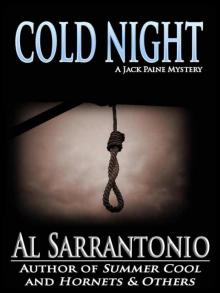 Cold Night (Jack Paine Mysteries)
Cold Night (Jack Paine Mysteries)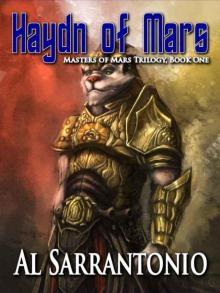 Haydn of Mars
Haydn of Mars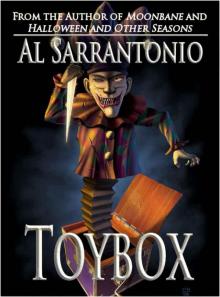 Toybox
Toybox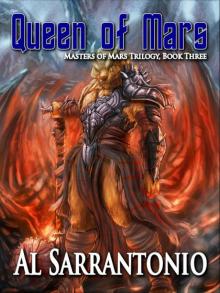 Queen of Mars - Book III in the Masters of Mars Trilogy
Queen of Mars - Book III in the Masters of Mars Trilogy Exile
Exile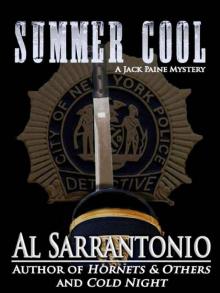 Summer Cool - A Jack Paine Mystery (Jack Paine Mysteries)
Summer Cool - A Jack Paine Mystery (Jack Paine Mysteries) Return - Book III of the Five Worlds Trilogy
Return - Book III of the Five Worlds Trilogy The Orangefield Cycle Omnibus
The Orangefield Cycle Omnibus Summer Cool jp-2
Summer Cool jp-2 The Boy With Penny Eyes
The Boy With Penny Eyes Journey - Book II of the Five Worlds Trilogy
Journey - Book II of the Five Worlds Trilogy Kitt Peak
Kitt Peak Campbell Wood
Campbell Wood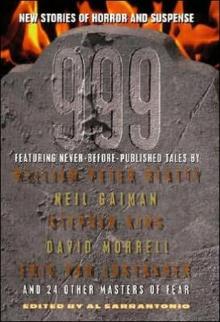 999
999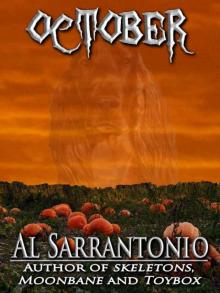 October
October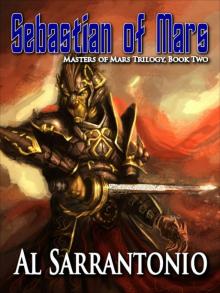 Sebastian of Mars
Sebastian of Mars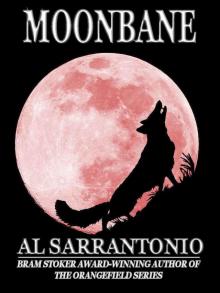 Moonbane
Moonbane Totentanz
Totentanz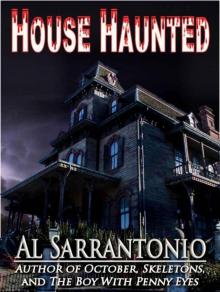 House Haunted
House Haunted Halloweenland
Halloweenland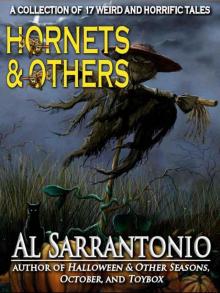 Hornets and Others
Hornets and Others